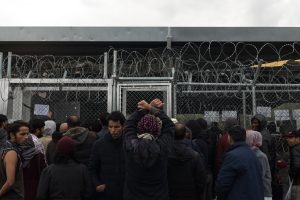TEL AVIV—Hezbollah launched rockets at Tel Aviv hours before Secretary of State Antony Blinken arrived in Israel for his first visit since the recent killing of Hamas’s leader , as the U.S. searches for an opening to end a war in Gaza that has sparked wider conflict in the region.
Five projectiles were fired at the Israeli business capital just before 8 a.m. local time, setting off warning sirens. Tel Aviv residents heard several explosions. The Israeli military said it intercepted most of the projectiles, with one falling in an open area, and said no injuries were reported. Hezbollah claimed responsibility for the attack, saying it targeted an intelligence base in Glilot, near Tel Aviv, belonging to the elite Unit 8200.
Blinken landed in Israel on Tuesday morning. His trip comes as Israel is continuing to battle Hamas in Gaza and Hezbollah in Lebanon, and as questions persist about what might bring an end to the fighting and what will happen after the conflict. The region is also on edge over an expected Israeli response to Iran’s attack earlier this month, in which it fired some 180 ballistic missiles at Israel.
Blinken is expected to discuss day-after plans for the Gaza Strip and humanitarian assistance for the Palestinian enclave during his meetings Tuesday with top Israeli officials, as well as the search for a diplomatic solution to the fighting in Lebanon.
Hezbollah’s latest rocket barrage from Lebanon shows that the U.S.-designated terrorist group has maintained its ability to fire rockets and other projectiles deep into Israel, despite a continuing military campaign that Israeli security officials say has substantially weakened the group.
Israel has had success in killing top leaders of Hamas and Hezbollah in recent weeks, including Yahya Sinwar of Hamas and Hezbollah’s Hassan Nasrallah . But neither group has indicated that it would stop the fighting.
The Biden administration has sought to frame Sinwar’s death as an opportunity to bring an end to the conflict in Gaza and to return hostages who were brought there after last year’s Oct. 7 attacks. At the same time, a senior State Department official said in advance of Blinken’s visit to Israel that it isn’t clear who is now making decisions for Hamas. And Israeli Prime Minister Benjamin Netanyahu said after Sinwar’s death that the war wasn’t over, indicating that Israel wants to continue pursuing Hamas .
Some 100 hostages remain in Gaza, including many who are dead, according to Israel. The families of the hostages remain concerned about their chances of survival after more than a year since they were taken, and argue that Netanyahu isn’t doing enough to free their relatives.
The conflict has devastated swaths of Gaza and led to more than 42,000 deaths in the enclave, according to Palestinian health authorities, whose figures don’t say how many were combatants.
Netanyahu has vowed to destroy Hamas but hasn’t spelled out a vision for how Gaza could be governed after the fighting. He has previously ruled out replacing Hamas with the Palestinian Authority, which governs parts of the West Bank, though that notion has drawn support from Israel’s security establishment.
Netanyahu has also said that re-establishing Israeli settlements in Gaza isn’t an Israeli aim, but the cause is gaining growing support within his own Likud party. Several lawmakers from his party took part in a conference calling to rebuild Jewish settlements in the enclave on Monday.
Hezbollah has said it is launching attacks on Israel in solidarity with Palestinians in Gaza and indicated that it will continue until there is a cease-fire there. The attacks have forced tens of thousands of residents of northern Israel to evacuate the area, and Israel says its goal in the current military campaign in Lebanon is to make it safe for them to return.
That campaign, which Israel initially described as limited in scope, expanded in recent days when Israel struck branches of a Hezbollah-linked bank, in what it said was an attempt to weaken the ties between the militant group and members of the country’s Shiite community. Israel’s bombardment and invasion has forced hundreds of thousands of people to flee southern Lebanon.
The Israeli air force struck additional targets in Beirut overnight Monday which it said were weapons-storage facilities and command centers belonging to Hezbollah’s naval unit. The Biden administration has indicated it wants Israel to scale back bombing in and around Beirut.
White House envoy Amos Hochstein met with Lebanon’s prime minister, parliament speaker and other officials on Monday. He told reporters in Beirut that a solution to the current fighting would have to go beyond implementation of U.N. Security Council resolution 1701, which ended the last full-scale war Israel fought with Hezbollah in 2006.
“The situation has escalated out of control as we feared that it could,” Hochstein said.
“Tying Lebanon’s future to other conflicts in the region was not and is not in the interest of the Lebanese people,” he said.
Write to Anat Peled at anat.peled@wsj.com and Alexander Ward at alex.ward@wsj.com



